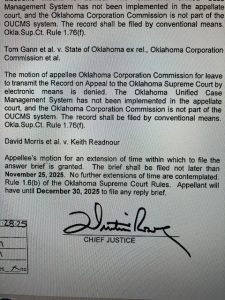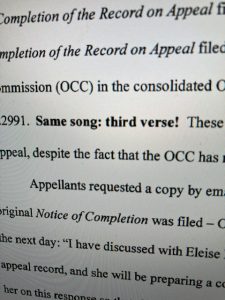
Supreme Court demands physical delivery
The Oklahoma Corporation Commission will have to deliver more than 7,000 pages of documents to the Supreme Court as it considers the filing of a lawsuit by three legislators challenging 2021 winter storm rate hikes and votes by Commissioner Todd Hiett. This confrontation now sits in one of the most high stakes energy legal battles since the winter storm. Oklahoma consumers still pay charges from securitization bonds. The lawmakers believe those votes should not have been allowed and the Supreme Court now controls the pace and the pathway of what happens next.
In a recent ruling handed down by Chief Justice Dustin Rowe, the commission was denied its request to deliver the records via electronic means. The commission stated the case involved “in excess of 7,000 pages” and would result in a “minimum of 28 bound volumes” which would need to be delivered in approximately two file boxes. The Supreme Court refusal to allow electronic delivery signals how seriously it treats this challenge. Physical filing means delay, time, manpower, and additional cost. The case already carries multi-billion-dollar implications, and now logistical complications add additional stress to the timeline.
Traditional filing requirement adds conflict
The denial explained “The Oklahoma Unified Case Management System has not been implemented in the appellate court, and the Oklahoma Corporation Commission is not part of the OUCMS system. The record shall be filed by conventional means.”
The demand for conventional delivery means the Oklahoma Corporation Commission must move forward under older procedural rules. This means the court sees this case not as ordinary litigation but as historic oversight of a regulatory structure that directly impacts almost every utility customer in the state.
Legislators say conflict of interest blocked transparency
Reps. Tom Gann, Kevin West and Rick West filed suit earlier in the year and argued that conflicts of interest should have prevented Commissioner Hiett from voting in support of winter storm rate hikes that totaled billions of dollars because of securitization bonds. Ratepayers will be saddled with monthly costs for nearly 25 years. Oklahoma households feel that burden monthly. Industrial consumers feel it even more sharply. Because the costs last almost a generation, the Oklahoma Corporation Commission decision stands as one of the most financially consequential regulatory votes in state history.
In an October 29 filing, the legislators also objected to the Commission’s Notice of Completion of the Record.
“Same song: third verse!” they wrote in bold letters in their response.

Lawmakers say delay costs millions monthly
They also complained they still do not have a copy of the Corporation Commission’s Record on Appeal even though the OCC twice certified that was “complete” and “ready.” Rep. Gann told the court that it ordered on May 5 to proceed with the appeal and he and Reps. West and West were still waiting for a functional copy of the OG&E rate case Record on Appeal.
“These unlawful delays are likely costing utility customers millions of dollars in illegitimate charges on their utility bills every month. This Court should put an end to them once and for all.”
The Supreme Court now holds the leverage. The Oklahoma Corporation Commission holds the paperwork. Oklahoma ratepayers hold the financial risk. And the outcome of this single case could redefine how future storms, emergencies, price spikes and regulatory votes get handled moving forward.

